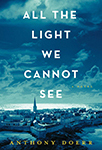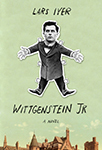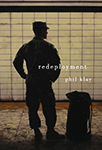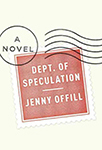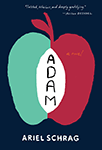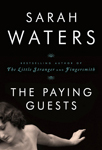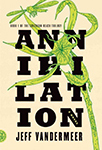by Jesse Ball
30% OFF at Powell’s »Victor LaValle: Me and my wife have taken to throwing dance parties during dinner. We do it just to keep our kids interested in the meal. Halfway through the night I tap the iPod and we let the kids down from their seats. Lately they’ve been bopping around to De La Soul. Seeing my three-year-old son and one-year-old daughter go wild for “Eye Know,” “Potholes in My Lawn,” and “Oodles of O’s” does a child of the ’80s good. 3 Feet High and Rising came out in 1989. That same year saw Done by the Forces of Nature by the Jungle Brothers and Road to the Riches by Kool G. Rap & DJ Polo; the Beastie Boys put out Paul’s Boutique. A damn good year. Because of the music in the house I was in a blissful state when my two books for this round arrived. I felt primed to appreciate mastery. Jenny Offill and Jeff VanderMeer did not disappoint. Rejoice, you motherfuckers! 2014 was one hell of a year for books.
Dept. of Speculation is a master class in economy and artful detail. Offill’s short, mesmerizing novel concerns an unnamed woman who narrates her life from about her mid-20s, single and adventurous, into early middle-age, when she has become a published writer, a writing teacher, a mother, and a wife. Offill has been praised, rightly, for her depiction of motherhood and marriage, and the joys and failures of both. She writes movingly as well about the effort of trying to be a writer when your world demands a wife and mother instead. Still, for me the novel was most compelling for its depiction of a woman navigating the seas of daily life in the leaky boat of her troubled mind. The portraits of a writer’s life and family travails are wonderfully done throughout, but it’s the narrator’s troublesome mind that creates a real sense of mystery. It’s the thing I don’t understand and want to understand. It’s a great mystery to her as well. She often seems baffled by her brain. Before she publishes her first novel, before she marries, before she becomes a mother, she is a young woman living alone in Brooklyn. One night, without warning, we get this:
I felt a sudden chill and pulled the blanket over my head. That’s the way they bring horses out of a fire, I remembered. If they can’t see, they won’t panic. I tried to figure out if I felt calmer with a blanket over my head. No I did not was the answer.
This stricken state recurs throughout the book. Many of the life choices the narrator makes are attempts to combat this anxiety, and her almost cosmic loneliness. As a young writer she posts a note over her desk: “WORK NOT LOVE! was what it said. It seemed a sturdier kind of happiness.” But after she does publish her first book she finds herself no happier. Publishing is no salvation. So what does she do? She marries. Has a daughter. All this, in part, to avoid really being alone with her mind, but it doesn’t work. “There is still such crookedness in my heart,” she says later. “I had thought loving two people so much would straighten it.”
Something is wrong, the novel suggests.
Jeff VanderMeer’s Annihilation seems like a very different novel at first. Four women, designated by their jobs rather than their names, have been sent into a place known as Area X. As the jacket copy states: “Area X has been cut off from the rest of the world for decades. Nature has reclaimed the last vestiges of human civilization.” Imagine a game preserve hidden behind a force field and the preserve is harmful to human life. The biologist, who narrates the novel, states her team’s job this way: “Our mission was simple: to continue the government’s investigation into the mysteries of Area X…”
The team treks through Area X—a gloriously vivid rendering of northern Florida—and quickly discovers the entrance to a tunnel, a spiraling pathway leading deep underground. The biologist becomes obsessed with entering the site. Other party members are violently opposed. There’s a feeling of mounting dread in this novel, right from the start.
If you looked out through these areas, toward the ocean, all you saw was the black water, the gray of the cypress trunks, and the constant, motionless rain of moss flowing down. All you heard was the low moaning. The effect of this cannot be understood without being there. The beauty of it cannot be understood, either, and when you see beauty in desolation it changes something inside you. Desolation tries to colonize you.
I read Dept. of Speculation before Annihilation but it didn’t take long before I felt both books were, in effect, saying the same thing to the reader. Something is wrong. In this way both novels felt like they were offering a tantalizing mystery. If you suggest that something is wrong, then I yearn to find out what it might be.
In the Offill, the mystery revolves around the narrator and her uneasy mind. In the VanderMeer, the mystery revolves around the narrator and the uncanny landscape. If I found myself trying to gather clues, then both books worked hard to upend expectations of simplistic solutions. Offill and VanderMeer are just too fucking good to pretend there will be easy answers. That said, one of them did find a way to offer a conclusion, if not a neat ending, and it was this that helped me make my decision between two formidable books.
In Annihilation the biologist does make it inside the winding tunnel structure in Area X. There she discovers words written on the walls, a long half-nonsensical phrase that continues farther and farther down the walls of the spiral pathway. Soon it becomes clear the words are fresh: Someone—or something—is writing them even now. The novel draws you forward with the promise of discovering that being. The biologist calls it the Crawler. The reader hopes that meeting the Crawler will finally clarify what, exactly, has gone so wrong in Area X.
Similarly, Offill’s narrator struggles through the trials of her marriage, the struggles of mothering, an infestation of bedbugs, the disdain of her childless friends, and eventually the anguished steps taken to start her writing career again, but throughout all of this her oldest accomplice—her clearest enemy—never leaves her side:
So she takes the pills the doctor gives her. Her hands stop flapping. She is less inclined to lie down in the street. But her brain is still buckling. In the parking lot of a store two towns over she cries like a clown with her face on the steering wheel.
I began to think of this narrator’s mind much like the Crawler in Annihilation: both just around the bend of a deep, mysterious pathway, both outsized in their effect exactly because they evade direct confrontation for so long.
But eventually the biologist will have an encounter down in that tunnel. When it happens the scene is overwhelming, illuminating, baffling, troubling. It’s exactly what I’ve been waiting for, but it’s nothing I could’ve anticipated. The moment—I hesitate to even call it a meeting—solves nothing neatly but does bring the novel toward a conclusion. All the mystery, all the dread, that’s been building for 175 pages finally crystallizes. I understand the biologist, and Area X, in a way that feels profoundly new, and yet uneasy. I remain off-balance but still immensely satisfied. It’s an incredible thing to pull off and VanderMeer does it with such grace.
Offill’s narrator, or more precisely her novel, never afforded me such a shift. Certainly things change for the narrator by the end of the novel—there’s a wrenchingly beautiful last page—but in the end, callous as this may sound, I never worried for her marriage or her daughter or her career the way I worried for her. Offill just does such a bang-up job of depicting a brilliant person whose greatest enemy is a force abiding within her. It’s extraordinary. Really none of her other struggles could compare. By the end of the novel it was this situation that I was hoping to have illuminated in some way. I wasn’t looking for some medical diagnosis, and I certainly wasn’t looking to see her cured or having a breakdown, but at the end I felt as if the novel had decided not to turn that last bend on the path, not to encounter the final ugliness it had been promising me. This was a shame, because I would’ve followed that woman anywhere. In real life people can spend their entire lives avoiding the Crawler, but in fiction the reader, at least this reader, is begging to see.
(As a little side note: In 2010, my second novel got to spend some time in the Tournament of Books. After a fun opening round win I lost to Marlon James’s excellent The Book of Night Women. I remember distinctly wanting to kick the judge in the nuts for that decision. So if Jenny Offill wants to kick me in the nuts for this one, I can’t blame her.)
Kevin: The Beastie Boys and De La Soul records name-checked by Judge LaValle were constant companions of mine throughout junior year of college. My connection to his artistic taste is immediate. Then he goes on to make an eloquent and sensible, fair and funny, thorough assessment of these novels. Nevertheless, this has to be the surprise of the tourney so far, John.
Jenny Offill’s book, a fixture on most of the prominent end-of-the-year lists, is such a tight and masterful piece of writing that if this were the Grammys it would almost certainly win “Performance of the Year.” Dept. of Speculation is almost like a pointillist painting, a novel made out of short prose poems. It’s not at all clear how a narrative will emerge from it, but it does, elegantly, like a negative in a darkroom.
Unlike most novels, it’s also a book that’s practically engineered to be read in one sitting. I have recommended Dept. of Speculation to several people this year. One of them, who had never heard of it, texted back just a few hours later to tell me they loved it. That’s some instant literary gratification.
John: I’ve read Dept. of Speculation twice and will no doubt read it again and then again after that. Part of this is that it is a one-sitting read, but more than that I marvelled at how Offill manages to make a novel out of both the material and her method. On its surface, it’s a book I should have no interest in, long having decided that I’ve read enough about young-ish people living in the boroughs of NYC for a lifetime. I am a reverse snob on that front.
But I’ve been waiting for a Jenny Offill novel since her first, Last Things, which I loved. That Dept. of Speculation apparently, at least fictionally, tells of some of what’s been going on with Jenny Offill between that book and this one only upped my interest.
In the end, it gets my highest compliment, which is a form of jealousy, where I begin to consider that maybe I too should try to write a novel in short, crystalline bursts because this is how all novels should be written. (I wised up to the stupidity of that notion pretty quickly because to write a novel that way only ups the degree of difficulty, and I find it difficult enough as it is.)
If I wasn’t versed in Victor LaValle’s work—which is a kind of realism/speculative fiction hybrid—I would be shocked at this judgment. I had a hunch that he would be sympathetic to VanderMeer’s doings.
Still, I’m surprised. I had Offill as a pre-tournament favorite.
Kevin: Annihilation is longer than Dept. of Speculation, but not by much. I also read it in one big gulp, with a delighted cat sitting on my lap.
Without giving too much away, the main character in Annihilation is undergoing a transformation throughout the book, and the patient manner in which VanderMeer reveals it to the reader is really wonderful and shocking. I turned the last page, gently lowered the suddenly irritated cat to the floor, and immediately went out to purchase the second Southern Reach novel.
John: It is exceedingly rare that a book can spook me, but Annihilation did the trick. I too read it in a burst and at times I felt all the claustrophobia and disorientation of the narrator. I don’t know that it has the same kind of impact as Dept. of Speculation, at least not for me, but for the pure pleasure of having words alter your consciousness for the period of time you’re reading them, it’s damned effective.
Kevin: Last month, the Wall Street Journal ran an article about slipstream fiction, which they describe as fiction that merges fantasy with reality. Of course, writers have been doing that forever without requiring a special label for it, but the authors of the article really stretched the definition to support their thesis that slipstream was a hip, current trend. The only thing most of the books they name (Annihilation, The Bone Clocks, Swamplandia!, The Particular Sadness of Lemon Cake) really have in common is that they have been contenders for the Rooster.
But this is really genrefication taken to an extreme. To the extent that genre labels have any use at all, it is to signal to readers that if they like book X, they might want to try book Y. But John, as a professional book recommender, do you have any reason to believe that someone who enjoys the magical realism of Lemon Cake would necessarily love Annihilation? They might. I did. But that would be coincidence.
The number of readers of any inclination is getting smaller, so after years of dividing up readers and putting them in boxes, publishers are now trying to create as many crossover hits as possible. As a result they say, “Annihilation is science fiction for people who don’t like science fiction!” Except that Annihilation is pretty much straightforward science fiction (or speculative fiction, if you prefer). The reason you might like it, non-sci-fi-reading reader, is not because it’s “slipstream.” You might like it because it’s good.
Richard Price is a terrific crime writer. You should read him whether you think you like crime fiction or not. Unfortunately, he didn’t feel like enough people were reading him. According to this New York Times profile, he looked at the bestseller list and saw that it was filled with what he thought were crappy crime novels. Naturally, he decided to write a crappy one (following some imaginary formula), hoping it would become a bestseller. He didn’t want to put his name on a crappy novel, so he wrote under a pseudonym. He also thought it would take him four months, but it took him four years. It is by most accounts excellent, and since it turned out to be just a regular Richard Price novel he now regrets not just putting his own name on it to begin with.
We have twisted ourselves into balloon giraffes with these genre labels, John. Richard Price made up a phony name because he doesn’t want to be lumped in with other crime writers. His desire to avoid such a label became the source of a condescending delusion: I can just write down to the bestseller list. But that makes no sense. Not every book on the bestseller list is bad, and the crappy ones aren’t on the bestseller list because they are crappy. No one knows how a novel—All the Light We Cannot See, for instance—makes it to the list. You can’t engineer it. The only proven way to guarantee that your novel will sell a gazillion copies is to be an author whose previous novel sold a gazillion copies.
John: Publishers have long twisted themselves into knots looking for the next [fill-in-the-blank]. For the last little while we’ve been waiting for the next Gone Girl, but of course there is no next Gone Girl, just like there wasn’t an All The Light We Cannot See before All the Light We Cannot See.
For those who are interested, I recommend Jeff VanderMeer’s long essay on the writing and publication of the Southern Reach trilogy. In one part he recounts that the idea of publishing all three volumes in a year came from his acquiring editor at FSG Originals, Sean McDonald. It’s both original thinking and a throwback move rooted in consideration of an audience whom McDonald thinks would be frustrated by having to wait around for the subsequent installments. VanderMeer agreed, even though he hadn’t written the second and third volumes yet.
It’s a bold experiment and it worked because an editor picked the right book and the right author. McDonald (whom I don’t know) seems to have followed his instincts, rather than trying to chase the phantom of finding the next whatever. [In the spirit of transparency, John also doesn’t know that McDonald is the editor of the ToB’s Rosecrans Baldwin —ed.]
Kevin: John, you and I have been doing this for a lot of years and Monday, for the first time, we’re going to do something I’m very excited about: We’re going to take a day off.
Elliott Holt is a Pushcart Prize-winning author whose celebrated first novel, You Are One of Them, was a New York Times Book Review Editor’s Choice. The list of awards it was longlisted for is too long to list. She is also a former ToB judge, and therefore, family.
Salon recently called Laura van den Berg “The Best Young Writer in America.” The ink on her debut novel, Find Me, will ruin your pants it’s so new, and it is also getting fabulous reviews. You should run out and get it now.
Elliott and Laura are taking over the commentary booth for Monday’s match between Emily St. John Mandel’s Station Eleven and Roxane Gay’s An Untamed State. We’ll be back the day after, but Elliott and Laura will return in each round of this year’s ToB to offer fresh perspectives and new thoughts while you and I clear our heads and watch hockey. We are thrilled that they’ve agreed to join us.




